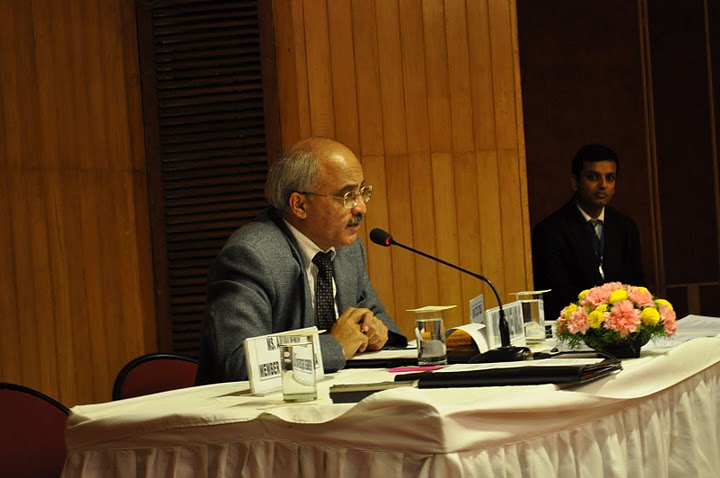
On November 18, 2010, IBJ INDIA, in conjunction with the Delhi Legal Services Authority (the Indian equivalent of the public defender system), hosted a “Workshop on Effective Legal Aid Advocacy” at the
India Habitat Centre. Approximately thirty advocates attended the workshop, representing district courts throughout New Delhi.
Left: Dr. K.N. Pillay delivers inspiring open remarks. Right: Legal Aid advocates engage in a discussion about their practices and share experiences.
Those who attended the workshop included legal aid lawyers (public defenders) with a varying amount of trial experience and officials from the Delhi Legal Services Authority (DLSA) (the government authority
charged with administering legal aid in New Delhi), including Ms. Asha Menon, Member Secretary of the DLSA.
The workshop was split into three sessions. Dr. K.P. Kylasanatha Pillay, Senior Advocate at the Supreme Court of India, delivered introductory remarks that inspired the legal aid lawyers about the purpose of the workshop and their profession in legal aid law. The workshop first included an open discussion amongst the lawyers about the challenges they are facing as legal aid attorneys. The lawyers also provided comments on what they would like to see in IBJ’s 2nd Edition of the Criminal Defence Resource Manual, a project currently underway. This discussion was very productive, as these trial advocates communicated the problems they are facing (for example, not having a court file on time or not having access to the latest legal resources). Additionally, the trial advocates made important suggestions on the Criminal Defence Resource Manual, such as including sentencing issues. The results of these discussions will shape IBJ INDIA’s current and future efforts and programs.
Second, the workshop included a one-hour interactive seminar on cross-examination and client interview techniques. This session was led by Andy Haas, volunteer lawyer for IBJ. The attorneys used a fact scenario that was distributed to them before the event. At the workshop, for the client interview exercise, participants divided into groups of two, and one participant assumed the role of the client and the other assumed the role of the attorney. The client was provided special instructions to fabricate answers during the first minute. After the session, the participants assuming the role of lawyers shared what the information they received. When attorneys found out that some of the information they received were fabricated, they discussed techniques on how to avoid such a pitfall. Conversely, when attorneys received crucial information from the client, they shared the types of questions they asked to get such information. For the workshop on cross-examination, the pairs reversed roles (the attorney who earlier acted as a client now became an attorney). The attorneys practiced their cross-examination techniques to elicit crucial information for the case.
Top left: Volunteer lawyer Andy Haas supervises and engages with Legal Aid advocates on cross-examination and client interview techniques. Top right: Volunteer lawyer Puneet Kakkar moderates discussion on challenges facing Legal Aid lawyers today. Bottom: Legal Aid lawyers prepare for interactive training sessions.
Third, the workshop concluded with remarks by Mr KTS Tulsi, one of the renowned criminal law advocates, who discussed his experiences. Mr. Tulsi discussed the importance of thorough fact investigation and how to bring out those facts during criminal proceedings. Further, the participants heard from Justice Pradeep Nandrajog of the Delhi High Court. Justice Nandrajog, who is reputable for his opinions in criminal law, spoke to participants about the nature of their work and his perspective of effective criminal advocacy, including cross-examination of expert witnesses.
Left: Mr. KTS Tulsi addresses advocates about cross-examination. Right: Honorable Mr. Justice Pradeep Nandrajog engages in an interactive discussion on criminal law.
After the event, participants continued to hold inspiring discussions informally over High Tea. Participants expressed the importance of having dialogues that analyze the current state of the legal aid system in India, and meeting with their colleagues to exchange stories, learn about successful methods, and grow together as legal aid advocates.
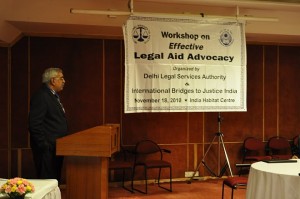
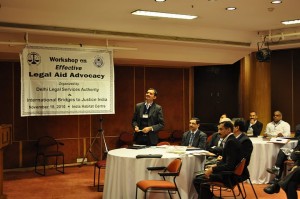
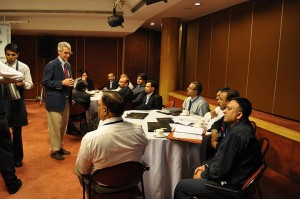
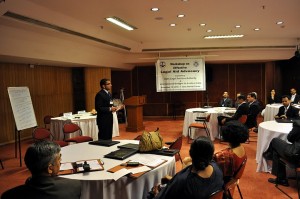
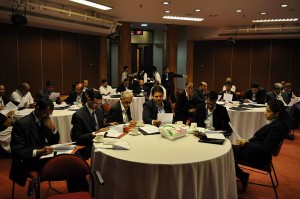
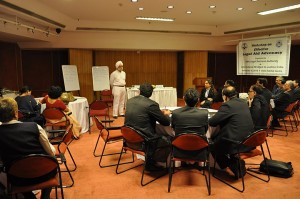
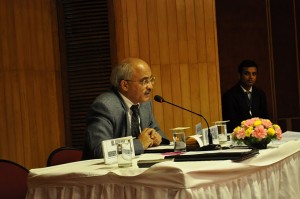
1 Comments, RSS